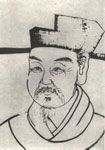两章洗尽眼底尘
只余架上万天花,照影清池三两曲。
江东诗仙花下饮,小摘繁枝篸醉玊。
惊飞雪片万许点,乱落酒船百余斛。
旧枝掠削自萦回,新枝奔迸无拘束。
诗仙诗满云梦胸,那更相逢此花触。
只愁毛颖倦驱使,一月屡向陶泓浴。
两章洗尽眼底尘,个字亦带花边馥。
凭谁说与柳柳州,休道一声山水渌。
愿参佳句法如何,夜雨何时对床宿。
两章洗尽眼底尘。宋代。杨万里。春风一夜吹滕六,旋落旋销不成簇。只余架上万天花,照影清池三两曲。江东诗仙花下饮,小摘繁枝篸醉玊。惊飞雪片万许点,乱落酒船百余斛。旧枝掠削自萦回,新枝奔迸无拘束。诗仙诗满云梦胸,那更相逢此花触。只愁毛颖倦驱使,一月屡向陶泓浴。两章洗尽眼底尘,个字亦带花边馥。凭谁说与柳柳州,休道一声山水渌。愿参佳句法如何,夜雨何时对床宿。
《再和罗武冈钦岩酴醾长句》是宋代杨万里创作的一首诗词。以下是这首诗词的中文译文、诗意和赏析:
春风一夜吹滕六,
Spring breeze blows through the night, awakening the sixth month,
旋落旋销不成簇。
Falling and dispersing, unable to form clusters.
只余架上万天花,
Only countless flowers remain on the trellis,
照影清池三两曲。
Reflecting their shadows in the clear pond, creating a serene scene.
江东诗仙花下饮,
The poet, a literary immortal from the eastern river, drinks beneath the flowers,
小摘繁枝篸醉玊。
Picking a few branches, intoxicated by their fragrance.
惊飞雪片万许点,
Startled, snowflakes scatter in countless numbers,
乱落酒船百余斛。
Chaotically falling onto the wine boat, filling hundreds of measures.
旧枝掠削自萦回,
Old branches are pruned and entangled,
新枝奔迸无拘束。
New branches grow vigorously without restraint.
诗仙诗满云梦胸,
The poet's heart is filled with poetic aspirations and dreams,
那更相逢此花触。
Yearning for encounters with these flowers.
只愁毛颖倦驱使,
Only worried that the poet's inspiration may wane,
一月屡向陶泓浴。
So he repeatedly seeks inspiration from the famous poet Tao Hong.
两章洗尽眼底尘,
Two chapters cleanse away the dust from his eyes,
个字亦带花边馥。
Each word carries the fragrance of the flowers.
凭谁说与柳柳州,
Who can convey my message to Liuzhou,
休道一声山水渌。
Don't just mention the scenery with a single word.
愿参佳句法如何,
I hope to learn from excellent poetic techniques,
夜雨何时对床宿。
When will the night rain accompany me to sleep?
这首诗词以描绘春天的景色为主题,通过描写花朵、清池和酒船等元素,展现了春天的生机和美丽。诗人以自然景物为媒介,表达了自己对诗歌创作的渴望和追求。同时,诗中也透露出诗人对于诗仙的崇敬和向往,以及对于诗歌创作的坚持和不懈努力。整首诗词以清新、明快的语言描绘了春天的景色,展示了诗人对于自然和诗歌的热爱,给人以愉悦和赏心悦目的感受。
杨万里
杨万里(1127年10月29日-1206年6月15日),字廷秀,号诚斋。吉州吉水(今江西省吉水县黄桥镇湴塘村)人。南宋著名诗人、大臣,与陆游、尤袤、范成大并称为“中兴四大诗人”。因宋光宗曾为其亲书“诚斋”二字,故学者称其为“诚斋先生”。杨万里一生作诗两万多首,传世作品有四千二百首,被誉为一代诗宗。他创造了语言浅近明白、清新自然,富有幽默情趣的“诚斋体”。杨万里的诗歌大多描写自然景物,且以此见长。他也有不少篇章反映民间疾苦、抒发爱国感情的作品。著有《诚斋集》等。...
杨万里。杨万里(1127年10月29日-1206年6月15日),字廷秀,号诚斋。吉州吉水(今江西省吉水县黄桥镇湴塘村)人。南宋著名诗人、大臣,与陆游、尤袤、范成大并称为“中兴四大诗人”。因宋光宗曾为其亲书“诚斋”二字,故学者称其为“诚斋先生”。杨万里一生作诗两万多首,传世作品有四千二百首,被誉为一代诗宗。他创造了语言浅近明白、清新自然,富有幽默情趣的“诚斋体”。杨万里的诗歌大多描写自然景物,且以此见长。他也有不少篇章反映民间疾苦、抒发爱国感情的作品。著有《诚斋集》等。
